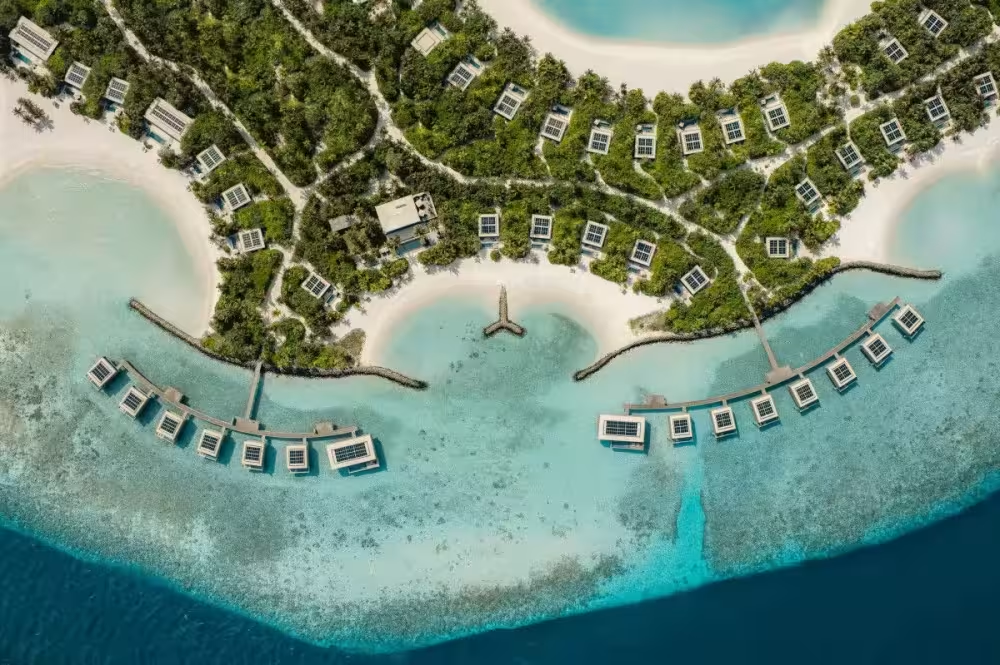The Fari Islands archipelago, home to luxury hospitality brands such as The Ritz-Carlton Maldives, Fari Islands, Capella Hotel Group’s Patina Maldives, and the innovative Fari Campus, is advancing its commitment to sustainability by significantly expanding its solar power capacity. By 2025, the destination aims to increase its renewable energy contribution threefold, reaching a total solar capacity of 6.4 MWp. This expansion is expected to provide up to half of the islands’ energy needs on sunny days, with overall solar power accounting for just under 50 percent when factoring in varying weather conditions.
Since its inception in 2021, the Fari Islands project, developed by Singapore-based Pontiac Land Group, has focused on sustainable design and construction. It stands as the largest hospitality development globally to extensively use offsite ‘Mass Engineered Timber’ technology, reducing carbon emissions by over 6,000 tons during production and transport. Prefabricated villas were designed with flat roofs instead of traditional Maldivian thatched styles, enabling easier solar panel installation while minimizing environmental impact. The community continues to pursue eco-friendly operations across all facets of the islands.
Pontiac Land Group CEO David Tsang emphasized the company’s dedication to responsibility and sustainability, stating that the renewable energy expansion marks a pivotal milestone in their environmental goals. He highlighted the company’s commitment to creating projects that not only uphold quality but also benefit the environment and society.
In partnership with Swimsol, a leading solar energy provider in the Maldives and a pioneer in marine floating solar technology known as SolarSea®, Fari Islands is developing one of the region’s largest solar installations. This includes the first floating solar system to be deployed in the ocean around the Fari Campus, consisting of 40 platforms with 2,160 photovoltaic panels. Scheduled for completion in late 2025, including a battery house, this installation alone will supply 24 percent of the islands’ total energy demand by adding 1,037 kWp to the grid.
The Fari Campus, which serves as the hub for island staff with a focus on community and education, has expanded its land-based solar capacity to 1,200 kWp across 19 residential and communal buildings. Meanwhile, The Ritz-Carlton Maldives, Fari Islands, increased its solar capacity in 2024 by installing solar panels on the roofs of its 61 Ocean Villas, followed by back-of-house areas, the Beach Shack restaurant, and Dive Centre, reaching a total capacity of 983 kWp. The resort earned two notable environmental recognitions in 2024, including the Green Globe Certification and the Forbes VERIFIED Responsible Hospitality badge, both reflecting its commitment to sustainability and responsible operations.
General Manager Oscar Postma expressed pride in the resort’s role within the Fari Islands ecosystem and the ongoing efforts to reduce its environmental footprint. He acknowledged that the collaboration with Swimsol is instrumental in advancing their shared net zero ambitions.
Patina Maldives is set to achieve a key sustainability milestone in 2025 by relying entirely on solar power during daylight hours. With a total of 2,994 kWp of solar panels installed—980 kWp on a land bank east of the island and 2,014 kWp across the rooftops of beach villas, F&B outlets, the FLOW Spa, dive centre, kids club, and back-of-house facilities—the resort also benefits from an additional 2 MWh of battery storage capacity. Patina Maldives recently earned back-to-back EarthCheck Silver Certifications and the Forbes VERIFIED Responsible Hospitality badge, underscoring its dedication to conscious luxury and environmental stewardship.
General Manager Anthony Gill noted that the completion of these solar installations marks a significant step towards a healthier, more sustainable future. He credited the passion of the team and partnership with Swimsol for making this achievement possible and emphasized the importance of protecting the Maldives’ natural beauty while demonstrating leadership in sustainability.



